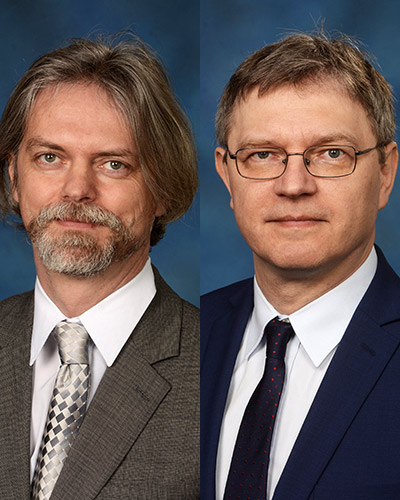April 26, 2023 | Deborah Kotz
Alterations Persist for Months and Are Tied to Ongoing Problems with Mental Health
Those who experience brain fog, memory issues or other neuropsychiatric symptoms for months after a COVID-19 diagnosis were found to have abnormal brain activity during memory tests on functional magnetic resonance imaging (MRI), according to a new study led by University of Maryland School of Medicine (UMSOM) researchers.
Long COVID accompanied with neurological symptoms was associated with less activity in certain brain regions normally used for memory tasks but more activity in other areas of the brain. Findings were published today in the journal Neurology, the medical journal of the American Academy of Neurology.
 “The greater activity occurred outside of the normal working memory brain network. We often see such changes in patients with a brain injury: Deficits in the default mode network of the brain leads to an increase in activity in other regions to help maintain brain function,” said study leader Linda Chang, MD, MS, Professor of Diagnostic Radiology and Nuclear Medicine at UMSOM and an associate member of the Institute of Human Virology (IHV) . “While our study doesn’t prove that COVID caused these brain changes, there appears to be a strong association with these changes and lingering neuropsychiatric symptoms.”
“The greater activity occurred outside of the normal working memory brain network. We often see such changes in patients with a brain injury: Deficits in the default mode network of the brain leads to an increase in activity in other regions to help maintain brain function,” said study leader Linda Chang, MD, MS, Professor of Diagnostic Radiology and Nuclear Medicine at UMSOM and an associate member of the Institute of Human Virology (IHV) . “While our study doesn’t prove that COVID caused these brain changes, there appears to be a strong association with these changes and lingering neuropsychiatric symptoms.”
An estimated 30 percent of those who had COVID-19 infections develop chronic symptoms known as long COVID. More than half of these patients develop cognitive or psychiatric symptoms with fatigue, difficulty concentrating, feeling depressed and anxious, being among the most prevalent symptoms, according to a report released in January by the Substance Abuse and Mental Health Services Administration.
While some patients experience a resolution of these issues within a year or two of diagnosis, others still suffer from daily disability more than three years after the onset of the pandemic. Researchers have been racing to conduct studies to learn more about long COVID in these patients in an attempt to develop better treatments.
To conduct the new study, Dr. Chang and her colleagues performed functional MRI scans on 29 patients who had COVID-19 an average of seven months earlier and had at least one ongoing neuropsychiatric symptom like memory loss, depression, or anxiety. Nine of these study participants had COVID-19 infections severe enough to require prior hospitalization. The researchers also conducted brain imaging scans in 21 healthy volunteers who had no history of COVID-19 and were of similar age, health status and vaccination status to those with long COVID.
All the participants had tests for thinking and memory skills, emotional health, motor function, as well as measures for symptoms of depression, anxiety, fatigue, and pain. They also had functional MRI brain scans while they performed tests to evaluate their working memory. The scans showed which areas of the brain were active during the tests.
“Even though the majority of people who had COVID-19 in our study reported ongoing problems with concentration and memory, they had scores on various tests for thinking skills that were similar to those who had no history of COVID-19,” Chang said. “This could be because their brains were compensating for these deficits by using more of other parts of their networks to maintain their performance.”
However, the long COVID group did have poorer scores on tests of dexterity and motor endurance than the non-COVID group. They also reported more negative feelings, such as anger and sadness, and higher levels of stress, and they had lower scores for life satisfaction compared to those who never had COVID. In addition, they had higher scores for depression, anxiety, fatigue and pain than the control group. People in the post-COVID group who had greater changes in their brain activity were more likely to have poorer scores in many of these symptom domains.
These patients could benefit from neurorehabilitation or psychiatric treatments, and the researchers recommend that doctors consider these approaches to help manage this condition.
The study had a few caveats: It was conducted mainly during early part of the pandemic when the Delta variant of the SARS-CoV-2 virus was circulating in the US. Results may not apply to the newer coronavirus variants like Omicron, and it is not known whether these newer variants affect the brain similarly. In addition, since antibody testing was not completed on the people who reported no prior COVID-19, it is possible that they had prior infections or exposure to the virus with no symptoms.
 The study was funded by the National Institute of Neurological Disorders and Stroke.
The study was funded by the National Institute of Neurological Disorders and Stroke.
Other UMSOM faculty, staff and students who served as co-authors on this study include: Meghann Ryan, MS, Huajun Lian, MBBS, PhD, Xin Zhang, MS, Eric Cunningham, BS, Justin Wang, Eleanor Wilson, MD, Edward Herskovits, MD, PhD, Shyam Kottilil, MBBS, PhD, Interim IHV Director, and Thomas Ernst, PhD.
“While this study provides crucial information on brain function in those who suffer neuropsychiatric symptoms from long COVID, we now need longitudinal follow-up studies to determine whether or when these abnormal imaging patterns will normalize and whether that correlates to a resolution in symptoms,” said UMSOM Dean, Mark T. Gladwin, MD, who is also Vice President for Medical Affairs, University of Maryland, Baltimore, and the John Z. and Akiko K. Bowers Distinguished Professor.
About the University of Maryland School of Medicine
Now in its third century, the University of Maryland School of Medicine was chartered in 1807 as the first public medical school in the United States. It continues today as one of the fastest growing, top-tier biomedical research enterprises in the world -- with 46 academic departments, centers, institutes, and programs, and a faculty of more than 3,000 physicians, scientists, and allied health professionals, including members of the National Academy of Medicine and the National Academy of Sciences, and a distinguished two-time winner of the Albert E. Lasker Award in Medical Research. With an operating budget of more than $1.3 billion, the School of Medicine works closely in partnership with the University of Maryland Medical Center and Medical System to provide research-intensive, academic, and clinically based care for nearly 2 million patients each year. The School of Medicine has nearly $600 million in extramural funding, with most of its academic departments highly ranked among all medical schools in the nation in research funding. As one of the seven professional schools that make up the University of Maryland, Baltimore campus, the School of Medicine has a total population of nearly 9,000 faculty and staff, including 2,500 students, trainees, residents, and fellows. The combined School of Medicine and Medical System (“University of Maryland Medicine”) has an annual budget of over $6 billion and an economic impact of nearly $20 billion on the state and local community. The School of Medicine, which ranks as the 8th highest among public medical schools in research productivity (according to the Association of American Medical Colleges profile) is an innovator in translational medicine, with 606 active patents and 52 start-up companies. In the latest U.S. News & World Report ranking of the Best Medical Schools, published in 2021, the UM School of Medicine is ranked #9 among the 92 public medical schools in the U.S., and in the top 15 percent (#27) of all 192 public and private U.S. medical schools. The School of Medicine works locally, nationally, and globally, with research and treatment facilities in 36 countries around the world. Visit medschool.umaryland.edu
Contact
Deborah Kotz
Senior Director of Media Relations
Office of Public Affairs & Communications
University of Maryland School of Medicine
Email: DKotz@som.umaryland.edu
o: 410-706-4255
c: 410-804-0054
t: @debkotz2
Related stories

Tuesday, May 02, 2023
AI in Medical Imaging Could Magnify Health Inequities, Study Finds
Artificial intelligence (AI) technology in the medical field has the possibility to automate diagnoses, decrease physician workload, and even to bring specialized healthcare to people in rural areas or developing countries. However, with possibility comes potential pitfalls.

Friday, April 21, 2023
In Memoriam: Rao P. Gullapalli, PhD, MBA
The University of Maryland School of Medicine community is mourning the loss of one of its longtime senior faculty members, Rao P. Gullapalli, PhD, MBA, who was Professor of Diagnostic Radiology and Nuclear Medicine, Associate Vice Chair for Research in the Department and Director of the Core for Translational Research in Imaging (C-TRIM) and Director of the Center for Metabolic Imaging and Therapeutics (CMIT). He also held several leadership roles in cancer imaging at the UM Marlene and Stewart Greenebaum Comprehensive Cancer Center.

Friday, July 29, 2022
Children Who Lack Sleep May Experience Detrimental Impact on Brain and Cognitive Development That Persists Over Time, UM School of Medicine Study Finds
Elementary school-age children who get less than nine hours of sleep per night have significant differences in certain brain regions responsible for memory, intelligence, and well-being compared to those who get the recommended 9-12 hours of sleep per night, according to a new study led by University of Maryland School of Medicine (UMSOM) researchers. Such differences correlated with greater mental health problems like depression, anxiety, and impulsive behaviors in those who lacked sleep. Inadequate sleep was also linked to cognitive difficulties with memory, problem solving and decision making. The findings were published today in the journal Lancet Child & Adolescent Health.

Monday, January 31, 2022
New Technique Consistently Works to Open Blood-Brain Barrier, Paving Way for Pre-Clinical Studies of Neurologic Drugs
University of Maryland School of Medicine researchers developed a technique in laboratory animals to consistently and reproducibly open the blood-brain barrier. This barrier serves as a barricade securing the brain from the external world blocking out certain environmental toxins, but also prevents drug therapies from reaching their intended targets. The new technique is based on a routine procedure for removing clots from the brain’s arteries in patients. This advancement was conducted by Piotr Walczak, MD, PhD, Professor of Diagnostic Radiology and Nuclear Medicine at the University of Maryland School of Medicine, and Miroslaw Janowski, MD, PhD, Associate Professor of Diagnostic Radiology and Nuclear Medicine at the University of Maryland School of Medicine.

Tuesday, July 06, 2021
UM School of Medicine Researchers Receive NIH Avant-Garde Award for Out-Of-Box Concept to Cure HIV and Treat Co-Existing Addiction
Linda Chang, MD, MS, Professor of Diagnostic Radiology & Nuclear Medicine at the University of Maryland School of Medicine (UMSOM), received the National Institute on Drug Abuse (NIDA) 2021 Avant-Garde Award (DP1) for HIV/AIDS and Substance Use Disorder Research — a National Institutes of Health (NIH) Director’s Pioneer Award. This prestigious award supports researchers with exceptional creativity, who propose high-impact research with the potential to be transformative to the field.

